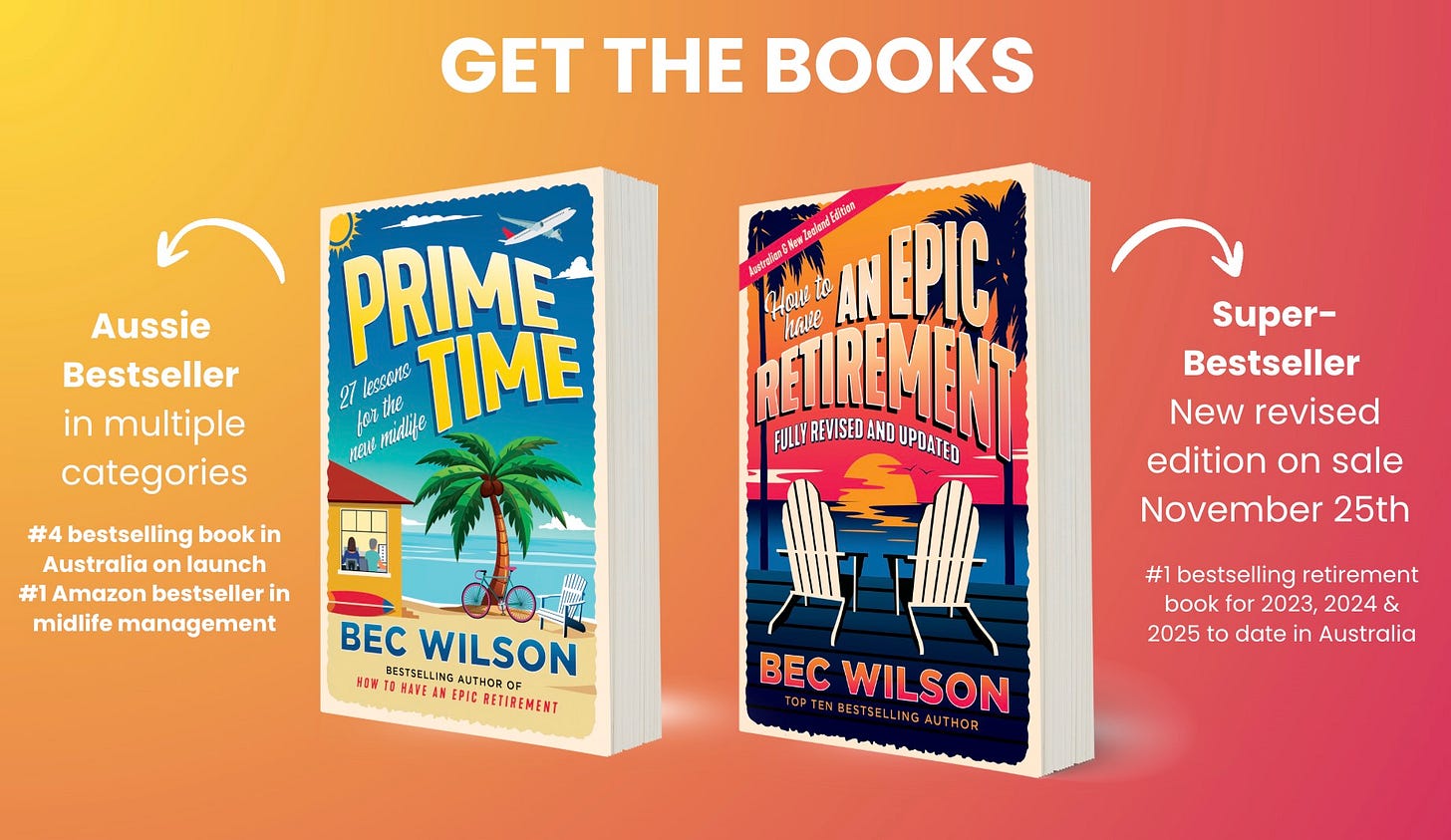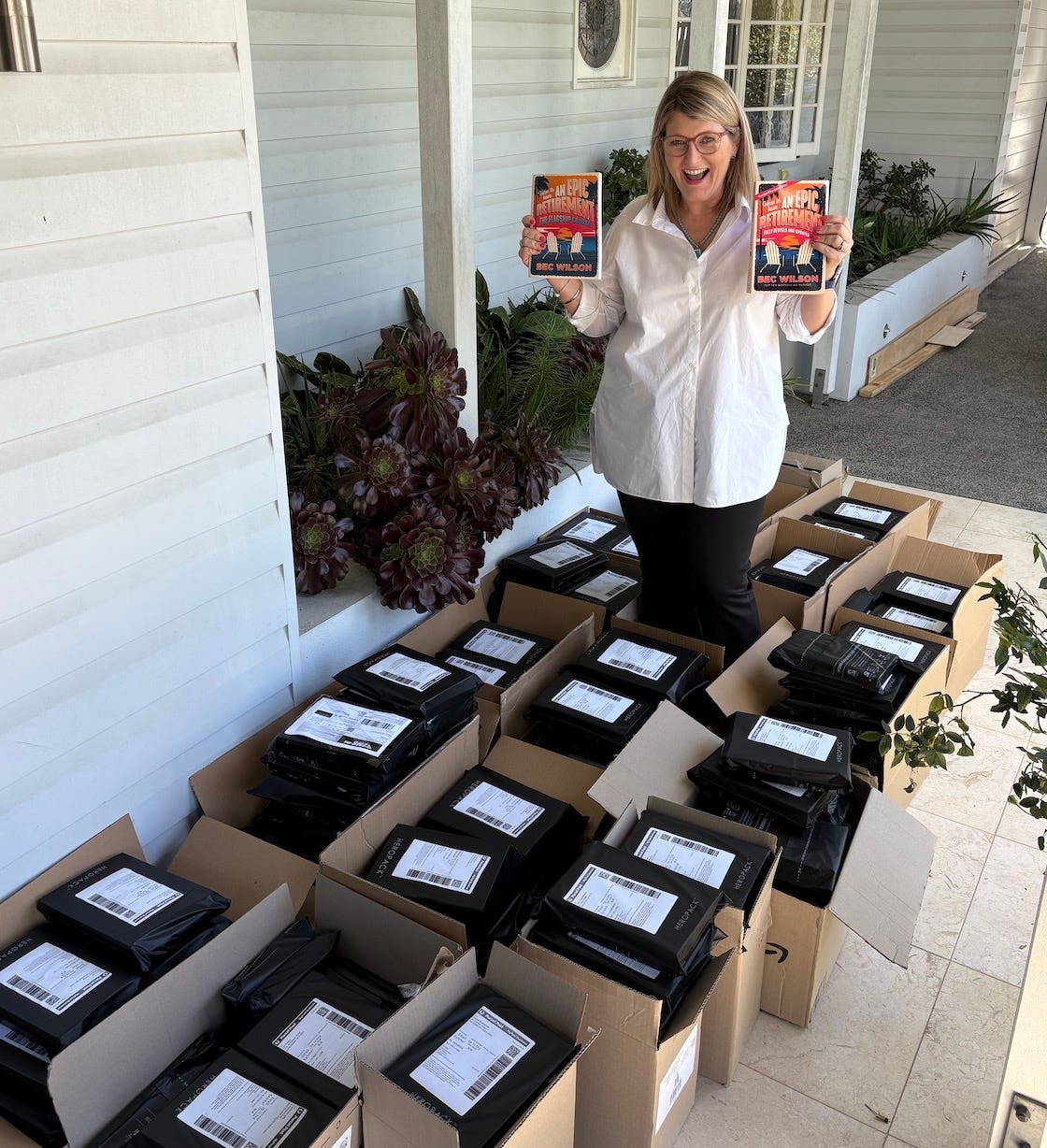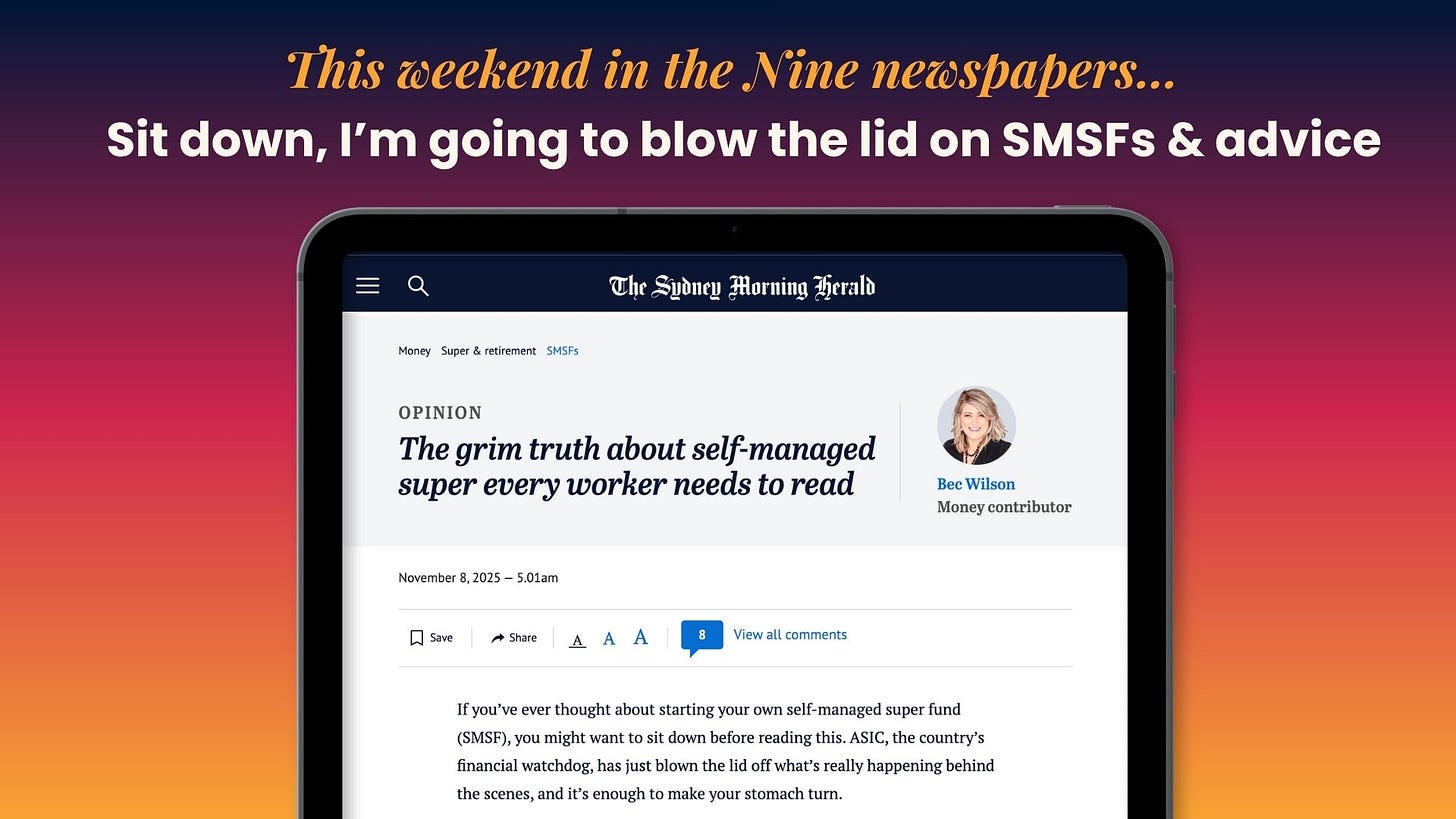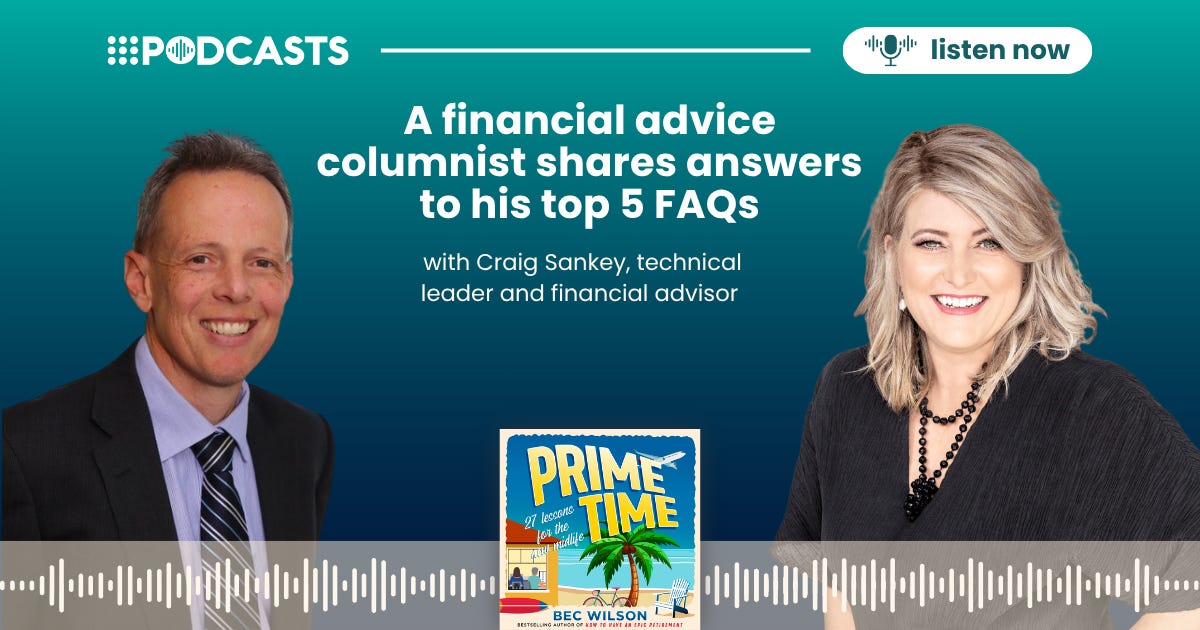The truth about when Aussies and Kiwis are actually retiring
And, in today's newspapers nationwide "The grim truth about self-managed super every worker needs to read"
In this edition
Feature: The truth about when Aussies and Kiwis are actually retiring
From Bec’s Desk: I got my first copies of the new edition of Epic Retirement!
SMH/TheAge: The grim truth about self-managed super every worker needs to read
Prime Time: A financial adviser and columnist shares answers to his top 5 FAQs
But first - check out our new Epic Retirement Shop packed with retirement merch (and there’s more to come). It’s just launched - in time for retirement-season and Christmas gifting at shop.epicretirement.net.
And order your copy of the books here:
Preorder the new Australia/New Zealand edition of How to Have an Epic Retirement here
Order your copy of Prime Time: 27 Lessons for the new midlife here
The truth about when Aussies and Kiwis are actually retiring
There’s some fresh data out this week that’s worth paying attention to if you’re anywhere near your 50s or 60s. The ABS just released the latest Retirement and Retirement Intentions report for 2024/25, and while there’s no shock headline, it does confirm what many of us are feeling – that real retirement is drifting later, and for many, the “dream age” is starting to look more like a “maybe one day” age.
What’s happening…
According to the data:
The average intended retirement age has crept up again to 65.6 years.
The actual average age of retirement is now 63.8 years.
And around 4.5 million Australians aged 45 and over are now retired.
So, while many people plan to retire in their mid-sixties - men plan to to retire at 64.9 and women 62.7 on average, the lived experience shows some doing it a little earlier – often for health reasons, redundancy, or caring responsibilities.
What it really means
There’s a gap between what we intend and what actually happens, and that gap is your planning opportunity and requirement. Because the truth is, retirement doesn’t always arrive on your own terms. Some people have to finish up earlier than expected. Others keep working longer because they want to – or because the cost of living or a sense of purpose keeps them going.
If you’re still in your Prime Time years (late 40s, 50s, early 60s), this is your window to get your next phase right. Ask yourself:
If I had to retire at 63 instead of 66, would my finances still hold up?
If I chose to keep working until 68, would I be doing something I enjoy?
What does flexibility look like for me — could I shift to part-time or self-employment rather than just “stop”?
The key is to build options into your plan now. Keep your health strong, keep your super contributions going, and start shaping a life where work, purpose and flexibility can coexist for a few extra years if needed.
Because, as I often say, the real goal isn’t to retire by a certain age – it’s to have the freedom to choose when and how you do it. Do you agree?
And for Kiwis…
Across the ditch, the latest data from Te Ara Ahunga Ora – the NZ Retirement Commission – paints a familiar picture. Retiring at 65 is common, but it’s far from the norm.
About one in five people aged 55–64 have already retired, and over a quarter of Kiwis aged 65+ still work for pay. Of those, around 70 per cent say they work because they want to, and 30 per cent because they have to – a split that neatly captures the balance between choice and necessity.
It’s also a story of financial pressure: 14 per cent of people over 65 have no savings or KiwiSaver, and among pre-retirees, more than a third admit they haven’t really thought about how they’ll draw down their savings once they stop working.
Add in low interest rates, housing costs, ill health, and redundancy, and it’s easy to see why the line between “working life” and “retirement” has blurred.
Just like in Australia, the data shows a growing group of people redefining retirement – working longer because they enjoy it, or because they need to – and another group facing early exits for reasons beyond their control.
I took delivery this week of the very first editions of the new Australia/New Zealand edition of How to Have an Epic Retirement — and she’s an absolute beauty. With about 100 new pages, it’s jam-packed with freshly updated and improved lessons for the next chapter of life.
The book officially hits stores on 25 November, but you can pre-order it here to make sure you get your copy before Christmas. Otherwise, you’ll find it in all the major retailers after launch day. (We’re lucky to have so many wonderful stockists — but if there’s a pre-Christmas rush, a pre-order is your safest bet!)
🎧 The audiobook marathon
Boy, am I getting tired of reading audiobooks! Almost every night — and a few days too — over the past week, I’ve been in the studio for six-hour blocks recording both the Australian/New Zealand and UK editions of Epic Retirement. All on top of full workdays. I’m a sucker for punishment, aren’t I?
I hope you enjoy them — I’ve been reading in my most energetic voice! Just 200 pages to go… Our current audiobook is a huge bestseller - so I know it’s worth the effort!
🎓 The flagship course is live
This week we also kicked off the brand-new edition of the How to Have an Epic Retirement Flagship Course. Our course participants are starting to receive their welcome packs — complete with the new book and the new workbook. It’s been so exciting to see everyone diving in and enthusiastically leaving comments
Meanwhile, our exclusive HESTA Epic Retirement program has just hit week 4, and the conversations have been amazing. It’s wonderful to see members engaging deeply with their retirement plans and learning how to turn ideas into action.
📅 Upcoming events — come along!
Lifestyle Communities Phillip Island: 12 secrets of an Epic Retirement
📍 Phillip Island, Victoria
🗓️ Saturday 15 November, 11am–2pm
I’ll be there live, speaking about The 12 Secrets of an Epic Retirement — a session packed with practical insights on how to create a fulfilling, flexible and financially confident next chapter.
👉 RSVP here
Aware Super Annual Member Meeting
💻 Online
🗓️ Thursday 20 November, 6–7.30pm (AEDT)
I’ll be hosting a panel of Aware Super experts, answering your questions about the big issues in retirement and managing your super.
The best part? It’s open to everyone — not just Aware Super members.
👉 Register to watch online here
Finally I’m off to the superannuation industry’s biggest conference on the Gold Coast this week - ASFA. So I hope to be able to share some valuable insider insights next week. Anything you want to know? Send me a message - I am LOVING getting your messages.
And that’s it from me! Now let’s embrace a day of rest!
Author, podcast host, columnist, retirement educator, and guest speaker
Extract of of my weekly column in The Age, The Sydney Morning Herald, Brisbane Times, WA Today on Sunday 9th November 2025.
The grim truth about self-managed super every worker needs to read
If you’ve ever thought about starting your own self-managed super fund (SMSF), you might want to sit down before reading this. ASIC, the country’s financial watchdog, has just blown the lid off what’s really happening behind the scenes, and it’s enough to make your stomach turn.
Too many people are being encouraged to set up SMSFs they don’t need, with money quietly siphoned off through fees, commissions and property deals along the way, ASIC found.
The people getting caught up in it are usually the ones who can least afford to take those risks, and the least likely to realise what they’ve signed up for until years later, when the fees have piled up and the investments haven’t performed as well as a simpler, lower-cost option – or worse, when those investments implode.
And sadly, ASIC’s reports often go unread by everyday people. They’re seen as dry, technical documents. The media don’t always pick them up because they don’t sound headline-grabbing. But this one matters because what it exposes goes right to the heart of who we can trust with our retirement savings.
ASIC’s review examined 100 real-life advice files from 12 higher-risk advice businesses. The results were disgraceful: 62 advisers failed to meet the best interests duty – the most basic rule of financial advice. Twenty-seven cases showed serious risks of client harm. Only 38 out of 100 met the legal standard.
The report comes hot on the heels of the Shield and First Guardian collapses, both cases where financial advisers and lead generators played key roles in funnelling people into retail investment platforms and allocating them into managed funds in their own interest.
It’s not personal advice. It’s a production line, and it’s incredibly profitable.
While most of those investors held their products inside superannuation platforms (and therefore have some recourse), some had been encouraged to roll their super into SMSFs to access the same investments. When those funds collapsed, their retirement savings went with them – with no recourse at all.
If you follow the trail, there are a few players everyday people should be wary of. First, the dodgy online spruikers and unlicensed operators flooding social media with ads urging people to “take control” of their super, usually by switching into an SMSF to invest in property or “build wealth”.
Then there are the highly visible advisers running aggressive, cookie-cutter businesses fronted by social media, “masterclasses” and relentless advertising. Many have slick offices, glossy feeds and an endless stream of self-congratulation about their “success stories”, often backed by a wall of dubious industry awards.
Read on — this article continues in The Age, The Sydney Morning Herald,Brisbane Times and WA Today. It is free to read - you may have to sign up, but there’s no paywall on my articles.
There’s no shortage of questions when it comes to retirement — but according to financial advisor and columnist Craig Sankey, there are five that come up again and again.
Craig joins me this week to unpack the most common questions he’s received after five years of writing a retirement advice column for The New Daily. He’s also a technical leader and advisor at Industry Fund Services — the advice partner behind many of Australia’s industry super funds — so he knows exactly what everyday Aussies are asking as they head toward retirement.
From how much super you really need, to the mortgage vs. super debate, to how to handle your money once you actually retire — this episode is full of practical, thoughtful advice for anyone planning their next chapter.
LISTEN TO THIS EPISODE OF THE PODCAST HERE:












With my partner having had a very torrid 12 months I decided to retire (although I'll keep studying) at 77. But I just bought her a humorous book discussing 101 things to do with me when I'm underfoot ☺️. If she keeps on improving, I may well un-retire if there is such a word. Retirement is for when you stop loving what you're doing and want to do something you love more. My best wishes to all those who have found that something. Kevin
I love this philosophy🌻